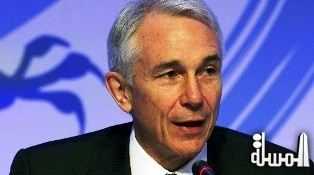
Remarks of Tony Tyler at a Public Lecture: The Benefits of Aviation to the Global Economy, University of Latvia
Almasalla,Gate Arab Tourism News-Riga – IATA Director General and CEO Tony Tyler gave a speech at Latvia University on the benefits of aviation and European aviation competitiveness yesterday. His speech followed a day of discussions in Riga with Prime Minister Laimdota Straujuma and Transport Minister Anrijs Matiss.
Topics addressed in the speech included comments on:
The growth of civil aviation 100 years after the first commercial air passenger flight
The global benefits of commercial aviation and the benefits to Latvia air transport connectivity
The importance of cooperation between industry and government to enhance competitiveness. The profitability of European airlines lags equivalent US carriers, hampered by onerous taxes, excessive regulation, and lack of investment and reform of key infrastructure.
The opportunity offered by Latvia’s Presidency of the EU from January 2015 to work for better regulation, to push for progress on the Single European Sky project, and to persuade governments to see aviation not as a cash cow but as a "goose that lays golden eggs".
Read Mr.Tyler’s speech

Remarks of Tony Tyler at a Public Lecture: The Benefits of Aviation to the Global Economy, University of Latvia
![]() The importance of aviation to Latvia should not be underestimated. According to a study of the benefits of aviation which IATA commissioned from Oxford Economics, the aviation sector contributes 0.8% to Latvian GDP – which rises to 2% of GDP when aviation-related tourism is factored in. The industry supports almost 8,000 jobs and an additional 12,400 in tourism. Aviation is a significant contributor of taxes to the exchequer, and of course, it provides incalculable benefits to the people of Latvia and the businesses that base themselves here. Latvian passenger air travel is set to grow upwards of 4.5% on average for the next few years, and cargo growth will not be far behind that — an excellent performance indeed. This is significant, for as Latvian trade diversifies and its economy produces more high-value, low-weight goods, the importance of air freight connectivity will increase.
The importance of aviation to Latvia should not be underestimated. According to a study of the benefits of aviation which IATA commissioned from Oxford Economics, the aviation sector contributes 0.8% to Latvian GDP – which rises to 2% of GDP when aviation-related tourism is factored in. The industry supports almost 8,000 jobs and an additional 12,400 in tourism. Aviation is a significant contributor of taxes to the exchequer, and of course, it provides incalculable benefits to the people of Latvia and the businesses that base themselves here. Latvian passenger air travel is set to grow upwards of 4.5% on average for the next few years, and cargo growth will not be far behind that — an excellent performance indeed. This is significant, for as Latvian trade diversifies and its economy produces more high-value, low-weight goods, the importance of air freight connectivity will increase.
In terms of air connectivity, by European standards, Latvia is well-connected for its size. Only Ireland, Switzerland, Portugal and Spain are better connected by air, and Latvia is better connected than comparable economies such as Denmark and Norway. Riga International Airport offers 83 destinations and handles more passengers than Vilnius and Tallinn’s airports combined. Given that Latvia was only relatively recently able to assert its independence, its integration into the global economy has been remarkable.
Latvian history and culture stretches back many hundreds of years, but I note that the modern history of Latvia essentially begins with its declaration of independence on November 18, 1918. That is interesting as it makes modern Latvia slightly younger than commercial aviation. Commercial aviation was born on 1 January 1914 in America, when a single paying passenger was flown across Tampa Bay in Florida. The entrepreneur that set up the St Petersburg-Tampa Airboat Line, Percy Fansler, said at the inaugural flight: “What was impossible yesterday is an accomplishment of today—while tomorrow heralds the unbelievable.”
Aviation as Economic Enabler
![]() Prophetic as Fansler was, even he could scarcely imagine the connected world we live in today. From one route and one passenger in 1914, aviation has grown to serve more than 3 billion passengers a year across 50,000 routes. If aviation were a country, it would be the 21st largest in the world ranked by GDP, larger than the pharmaceuticals, textiles or automotive sectors. But more than that, aviation is a tremendous enabler of economic activity. A third of all global trade by value goes by air – around $7 trillion. The smart phone in your pocket can only be built to an affordable price because of the global supply chain that aviation facilitates. Aviation is a multiplier of jobs. Directly, it employs nearly 9 million people around the world. But when you add in indirect, induced and tourism-related employment, aviation supports 58 million jobs. 52% of tourists travel by air, thereby making aviation essential for the $2 trillion global tourism market.
Prophetic as Fansler was, even he could scarcely imagine the connected world we live in today. From one route and one passenger in 1914, aviation has grown to serve more than 3 billion passengers a year across 50,000 routes. If aviation were a country, it would be the 21st largest in the world ranked by GDP, larger than the pharmaceuticals, textiles or automotive sectors. But more than that, aviation is a tremendous enabler of economic activity. A third of all global trade by value goes by air – around $7 trillion. The smart phone in your pocket can only be built to an affordable price because of the global supply chain that aviation facilitates. Aviation is a multiplier of jobs. Directly, it employs nearly 9 million people around the world. But when you add in indirect, induced and tourism-related employment, aviation supports 58 million jobs. 52% of tourists travel by air, thereby making aviation essential for the $2 trillion global tourism market.
Any way you look at it, aviation is a big business, and it helps other businesses to grow. But of course, that is only the tip of the iceberg. Aviation offers so much more. Commercial flight has made the world a smaller place. It has brought greater understanding of our planet’s incredible diversity of cultures, races and religions. It has fostered the spread of education, ideas and innovations. It has been an undoubted force for good.
I know that the events in Ukraine have deeply concerned the Latvian people. I won’t go into the historic and political reasons why – you know these yourself far better than I– but I would like to comment on some of the practical work we have undertaken in the aftermath of the terrible shooting-down of MH17.
Let me be clear: MH17 was a civilian airliner crossing airspace at a height that had been declared safe, as was made clear in the preliminary report released by the Dutch authorities just yesterday. Its targeting by a surface to air missile, whether by accident or design, was a criminal act. I hope the perpetrators are brought to justice. What this unprecedented event has illustrated is that, although aviation remains safe, there is a gap in the system that needs to be addressed.
That is why it was important that the International Civil Aviation Organisation – ICAO – took the lead in formulating the response. Together with our airport and air navigation colleagues, IATA has joined an ICAO taskforce that is focused on finding a global, practical solution for flying across conflict zones. Better information sharing is the key—though we must recognize that this is an area of great political sensitivity. The industry will do all it can but ultimately it will need governments working through ICAO, to find a solution. We also believe that it is important for work to begin on a longer-term goal of better control of the manufacture and trading of surface-to-air weapons.
Cooperation is Vital
The vital importance of global aviation means that those people charged with the responsibility of providing aviation services and regulating its performance have nothing less than a pivotal role in the well-being of everyone on Earth. It is incumbent on industry and policy-makers to work closely together to ensure a strong, safe, secure and sustainable air transport system.
And in just a few months, Latvia will have a vital role in exercising this responsibility. From January, Latvia will take on the Presidency of the European Union. This is a critical opportunity to influence the direction of the European Union, and particularly to help strengthen the air transport sector in the region.
Europe has an impressive air transport sector. The 200-plus airlines in the EU28 support 9.2 million European jobs and about $660 billion of Europe’s GDP. They connect a continent that accounts for 10% of the world’s population, is the largest single economy on the planet, and which is home to amazing world heritage sites, cultural assets and superb academic institutions.
So, how is it that Europe’s airlines are not more successful? It is a fact that European airlines are financially the weakest amongst the world’s major regions. The difficulties Air Baltic have found in finding new investment, despite the strong turnaround in the airline’s recent performance, reflects the reality of this situation. We expect European airlines to realize a post-tax net profit of $2.8 billion this year, for an average net profit margin of just 1.3%. Put another way, they will make about $3.23 per passenger. That’s less than a third of the $11.09 per passenger that their counterparts in North America will earn.
I believe the reason for this poor financial record is the competitive disadvantages that Europe’s governments place in their way. The industry here is over-taxed, onerously regulated and suffers from a chronically mismanaged air traffic management (ATM) system, insufficient airport capacity and overall costs for infrastructure that are too high. Let me elaborate.
Onerous Taxation
On taxation, the poster child for onerous taxation is the UK’s Air Passenger Duty. Alone it collects nearly $4.5 billion every year. But it is not the only one. Germany and France also have counter-productive passenger taxes. In the last two months alone, IATA has worked with our members and partners to respond vigorously to aviation tax proposals in Portugal and Sweden.
This year the total European tax bill for airlines and their passengers will reach nearly $40 billion. To put that into perspective, that is more than double what is paid in the Asia-Pacific region. There is a stark contrast between Europe and much of Asia and the Middle East, where many governments value aviation more for the long-term economic value that the industry makes possible than for its short-term tax receipts. The remarkable performance of some of the Gulf carriers, for example, is inextricably linked with the vision of their governments to place aviation at the heart of their economic strategies. Airlines in the Gulf are provided with world-class infrastructure and a regulatory and fiscal framework that promotes, rather than hinders, aviation connectivity.
Some European governments are finally coming to the conclusion that they can no longer take aviation for granted. Some now understand that aviation’s true role is not as a cash-cow, but a delicate goose that lays golden eggs. The Irish government, for instance, has removed its departure tax because of the economic damage that it was doing. During its Presidency, I hope that Latvia will help refocus European governments on the economic value that aviation can deliver.
Better Regulation
European regulation of the aviation industry generates several competitive disadvantages. First is that Europe is developing a tendency to over-regulate—often even when global standards already exist. And this often comes with unintended consequences. Passenger rights is a good example. EU regulation 261 seeks to “protect” passenger rights. But its draconian measures compete and conflict with some 60 other passenger rights regimes. From the passenger’s perspective, all this “protection” is just a confusing mess.
Airlines are committed to providing safe, comfortable and high-quality services to their customers. IATA’s members last year even adopted a resolution outlining a set of fair and consistent global best practices on passenger rights. And we are encouraging governments to do the same by working with ICAO.
ICAO is the forum where governments agree on global standards to support global air transport. That is why it is has always been the focal point of our approach to managing aviation’s carbon footprint. The industry is asking governments to agree on a mandatory global carbon offset scheme through ICAO which we will need to achieve our commitment to carbon neutral growth from 2020. And earlier this year we had a reminder of how successful the ICAO process can be when governments agreed on revisions to the Tokyo Convention which will modernize the rules for dealing with unruly passengers.
What does all this mean for the Latvian Presidency? I hope that Latvia will be a strong voice for aligning EU Regulation 261 to global principles on passenger rights and that it will encourage European governments to ratify the changes to the Tokyo Convention. Moreover, we are counting on Latvia to be a strong supporter of the ICAO process to develop a global framework for market-based measures to manage carbon emissions.
There is also an urgent need to address the failures of “light touch” economic regulation of infrastructure providers. For example, earlier this year the German air navigation service provider announced that it was increasing its charges by $300 million a year from 2015.
These examples show why we need a counter-balance to the market power of many infrastructure providers. Effective independent regulators must apply well-established international norms to bring about fair-charging regimes—regimes that will facilitate enhanced connectivity that can drive economic growth.
Infrastructure
And lastly, I call on Latvia to be a strong supporter of much-needed infrastructure improvements. The problems are many. By Eurocontrol’s own estimation, there will be a 12% shortfall in Europe’s airport capacity by 2035. That is a major concern for Europe’s economic growth. But the severity of Europe’s infrastructure constraints is evident in that there is an even higher priority issue—delivering the Single European Sky (SES).
The costs of inadequate air traffic management to Europe are enormous—at least EUR 3 billion for airlines and EUR 6 billion for consumers in lost time and productivity each year. On top of that, there is the environmental cost of 7.8 million tonnes of unnecessary carbon emissions.
Europe needs the SES. But member States—Latvia included—are not delivering. They are pandering to local interests and sacrificing social and economic gains to the frustration of the European public. I cannot put this too strongly. The failure to implement SES is the biggest infrastructure issue that the aviation industry faces. The next few months will be critical in determining the adoption of the “SES2+ package”—something that Europe urgently needs.
We must seize this opportunity to evolve European air navigation service monopolies into customer-focused and cost-effective members of the air transport value chain. The most important contribution that Latvia could make to Europe’s air transport sector over its six month Presidency is to push forward SES2+ to completion, building on the work of the current Italian Presidency.
Conclusion
Over the last 100 years, commercial aviation has demonstrated its ability to be a catalyst for economic activity and a driver of prosperity. Europe’s air transport sector—including Latvia—is in desperate need of leadership to alleviate the tax burden, improve regulation based on global standards and develop infrastructure to enable success. We are counting on Minister Matiss to be a strong force for much-needed progress and to set the stage for aviation to make an even greater contribution to European development in its next century.
Aviation is celebrating its centennial this year, and in four years’ time Latvia will be too. The last hundred years have seen more change than almost the rest of human history put together. Perhaps the biggest change has been the development of the true ‘global village’. That has only been possible because of aviation. And Latvia’s rapid integration into the global economy post-independence means that you have a greater appreciation than most of the importance of connectivity. A modern economy cannot survive and develop without the global connectivity that only aviation can deliver. Latvia is no exception. And neither is Europe.
Let us be under no illusions. Europe’s airline industry is struggling. But the position is not hopeless: the simple steps that I have outlined today—raising competiveness through fiscal and regulatory reform, and prioritizing better infrastructure—can deliver improvements. Above all, it needs a change of mindset: placing aviation connectivity at the heart of a nation’s economic strategy. Latvia has an opportunity to push for that positive change, and in fact to lead this region towards it. For Europe’s sake, and the world’s, I wish you every success in that endeavor.







